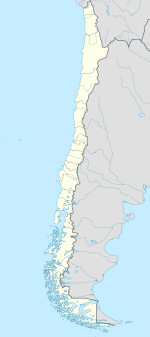This article needs additional citations for verification. (July 2010) |
Temuco | |
|---|---|
 View of Temuco from Cerro Ñielol | |
| Coordinates: 38°44′S 72°40′W / 38.733°S 72.667°W | |
| Country | |
| Region | Araucanía |
| Province | Cautín |
| Founded | 24 February 1881 |
| Government | |
| • Type | Municipality |
| • Alcalde | Roberto Neira Aburto (PPD) |
| Area | |
| • Total | 464.0 km2 (179.2 sq mi) |
| Elevation | 360 m (1,180 ft) |
| Population (2017 Census)[3] | |
| • Total | 282,415 |
| • Density | 610/km2 (1,600/sq mi) |
| • Urban | 263,165 |
| • Rural | 19,250 |
| Demonym | Temucan |
| Sex | |
| • Men | 134,289 |
| • Women | 148,126 |
| Time zone | UTC−4 (CLT) |
| • Summer (DST) | UTC−3 (CLST) |
| Area code | 56 + 45 |
| Climate | Cfb |
| Website | Official website (in Spanish) |
Temuco (Spanish pronunciation: [teˈmuko]) is a city and commune, capital of the Cautín Province and of the Araucanía Region in southern Chile. The city is located 670 kilometres (416 miles) south of Santiago. The city grew out from a fort of the same name established in 1881 during Chile's invasion of Araucanía.[4] Temuco lies in the middle of the historic Araucanía, a traditional land of the indigenous Mapuche.
Temuco's central place in Araucanía with easy access to the Andean valleys, lakes and coastal areas makes it a hub for tourism, agricultural, livestock and forestry operations as well as a communication and trade centre for the numerous small towns of Araucanía. Temuco has recently been regarded as a university city as it houses two large universities: University of the Frontier and Temuco Catholic University. Nobel laureates Gabriela Mistral and Pablo Neruda both lived in Temuco for some time.
- ^ "Asociación Chilena de Municipalidades" (in Spanish). Archived from the original on 31 December 2017. Retrieved 7 February 2011.
- ^ "Municipality of Temuco" (in Spanish). Archived from the original on 31 December 2017. Retrieved 7 February 2011.
- ^ a b c "Resultados CENSO 2017". National Statistics Institute of Chile (in Spanish). Retrieved 20 October 2024.
- ^ Bengoa, José (2000). Historia del pueblo mapuche: Siglos XIX y XX (Seventh ed.). LOM Ediciones. pp. 280–281. ISBN 956-282-232-X.


